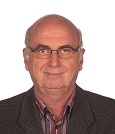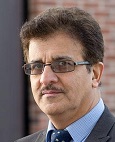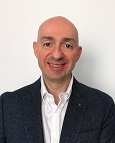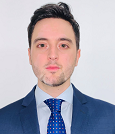|

|
|
Andreas Voss was since 1997 Full Professor in Biosignal Processing and Medical Informatics at the Ernst-Abbe-Hochschule (EAH) in Jena, Germany. Before that, he worked as leader of the Biosignal Processing research group at the Max-Delbrueck-Centre for Molecular Medicine in Berlin. In 2015, he founded the Institute of Innovative Health Technologies IGHT at the EAH where he acts up to 2020 as the director and coordinated the research between five different departments. After his retirement, Professor Voss focuses on research in two main areas, autonomic regulation, and electronic senses (electronic nose). Here he works as a Guest Professor at two renowned German universities, the Institute of Biomedical Engineering and Informatics (BMTI) at the Technical University of Ilmenau and the Department of Pediatric Oncology and Hematology at Charité Berlin. He also led the medical evaluation in the Thuringian model of mindful universities.
His research interest are linear and non-linear analysis of multivariate and multiscale data and systems analysis (e.g., risk stratification in different diseases), characterizing autonomic regulation (heart diseases, schizophrenia, depression, stress...), time-frequency analyses, knowledge-based interpretation of physiological and pathophysiological regulations, and electronic senses (electronic nose). Prof. Voss (h-index 44, RG score 43.84) published more than 330 papers in peer reviewed journals. He is member of scientific societies (DGBMT, European Society of Cardiology, and IEEE), organizer, co-organizer, and associated editor of various national and international conferences as well as member of scientific boards of various other academic events and scientific journals. He acts as reviewer and for many international journals, conferences, and grant agencies.
|
|
|

|
|
Saeid Sanei received his PhD in Biomedical Signal and Image Processing from Imperial college London in 1991. Since then, he has been working in National University of Singapore, King’s College London, Cardiff University, University of Surrey, and currently in Nottingham Trent University (as a Professor of Signal Processing & Machine Learning) and Imperial College London (as an Academic Visitor). He is a Fellow of British Computer Society (FBCS) and a Senior Member of IEEE. Biosignal and Image Processing, Brain-Computer Interfacing (BCI), Assistive Technology, Bio-statistical Data Processing, Biomedical Systems Modelling, Body Sensor Networking, Speech, AI & Machine Learning, IoT for health monitoring are his main research areas. Prof Sanei published 5 books, a number of book chapters and edited books, and over 400 peer-reviewed publications. He has been an Associate Editor for the IEEE Signal Processing Magazine, IEEE Signal Processing Letters, and Journal of Computational Intelligence and Neuroscience. He organised and chaired a number of reputed conferences including the 44th IEEE International Conference in Acoustics, Speech, and Signal Processing (ICASSP 2019) in the UK.
|
|
|

|
|
José J. Rieta received the M. Eng. degrees in Image and Sound Engineering from the Polytechnic University of Madrid, Spain, in 1991, the M. Sc. degree in Telecommunication Engineering and the Ph.D. degree in Biomedical Signal Processing from the Polytechnic University of Valencia (UPV), Spain, in 1996 and 2003, respectively. He is Full Professor at the Electronic Engineering Department of the UPV, becoming Lecturer since 1995. He has taught many subjects related to Electronic and Biomedical Instrumentation, Analog Systems, Data conversion Systems and Control Engineering, and has been the author of several academic publications in these areas.
As researcher he has coauthored about 90 publications in international Journals of his field, more than 300 international and national conference communications as well as 18 books or book chapters related to biomedical engineering and cardiovascular diseases.
Prof. Rieta has participated in more than 30 competitive research grants since the last 25 years, being the leader in 19 of them, with special mention to four National Research Grants from the Spanish Research State Plan. He has participated and leaded many agreements of technological transfer with companies related to biomedical engineering during last 20 years. As additional contributions to society, Dr. Rieta has performed an intensive training of young researchers with the supervision of 12 doctoral theses, where most of his trained researchers are now Lecturers and/or researchers at reputed universities, hospitals or expert engineers at private companies.
In 2006 he founded the Biosignals & Minimally Invasive Technologies (BioMIT.org) research group in the UPV, where is the CEO and responsible of the advanced biomedical signal processing line. His research interests include the application of artificial intelligence, statistical and non-linear signal processing to biomedical signals, specially focused in cardiovascular signals aimed at developing clinical solutions to study, monitor and characterize the cardiovascular system and cardiovascular pathologies.
|
|
|

|
|
Alfonso Maria Ponsiglione, MSc and PhD in Biomedical Engineering, is researcher in Electronic and Information Bioengineering at the Department of Electrical Engineering and Information Technology of the University of Naples "Federico II" and assistant professor of the course "Healthcare System Management".
Since 2014 he has been conducting research in the field of biomedical engineering and healthcare engineering. He worked as software programmer and healthcare ICT consultant for two national private firms operating in the field of healthcare information systems. Meanwhile, he carried out research at the Center for Advanced Biomaterials for Healthcare of the Italian Institute of Technology and participated in research collaborations with the Erasmus Medical Center of Rotterdam, with the School of Pharmacy and Biomedical Sciences of the University of Central Lancashire, and with the Department of Experimental and Clinical Medicine of the University "Magna Græcia" of Catanzaro. He is also co-founder of Kyme NanoImaging Srl, a biotech start-up developing products for Medical Imaging.
At University of Naples "Federico II", he has been continuously collaborating with research groups affiliated to the Department of Electrical Engineering and Information Technology, the Department of Chemical Materials and Production Engineering, the Department of Public Health, and the Department of Advanced Biomedical Sciences.
His research background and competences cover several aspects and disciplines in the biomedical engineering domain, spanning from the processing and analysis of biomedical signals and data to the modelling and simulation of health systems, to the design of biomaterials and nanotechnologies for medical applications, and to the business development of biotech solutions. Indeed, he carried out research in the field of nanomedicine, contributing to the design of nanocarriers for enhanced Magnetic Resonance Imaging applications. He has been working in the field of biosignal processing, regarding the use of linear and nonlinear techniques to process and analyze foetal heart rate variability from cardiotocographic traces and regarding the development of personalized rehabilitation platform for chronic elderly patients. He is also conducting research in healthcare management, with a specific focus on the application of Lean Six Sigma principles, statistical analysis and simulation models for the improvement of healthcare services.
Currently, his main research activities are focused on both the analysis of cardiotocography signals and on the development of simulation models to support clinical decision-making and management of healthcare organizations.
|
|
|